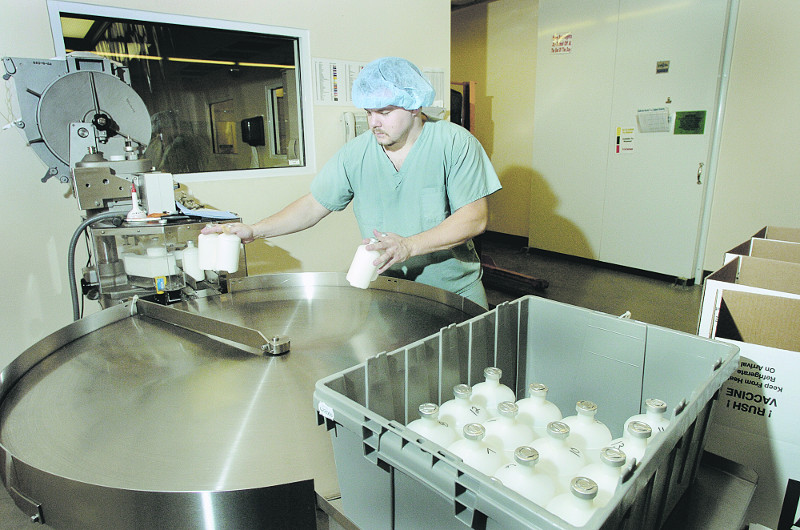This article was originally published on Sept. 10, 2013. A subsequent story, published on Sept. 20, 2013, contains some clarifications to the initial report.
A Maine company may have helped Syrian dictator Bashar Assad build his biological-weapons capability when it illegally shipped vaccines containing a flu-like avian disease virus to Syria in 2001 and early 2002.
Maine Biological Laboratories of Winslow, now a division of the German firm Lohmann Animal Health, GmbH, shipped more than 14 million doses of its vaccine for Newcastle disease, a pathogen that’s deadly to chickens and other commercial poultry, to a Syrian company in 2001.
At the time, such exports required special licenses because Syria was suspected of sponsoring terrorism. The company paid a $100,000 civil penalty to settle charges related to the incident brought by the U.S. Department of Commerce’s Bureau of Industry and Security.
The company admitted that it had shipped the vaccine with the knowledge that its action violated a federal export ban.
On Saturday, The New York Times published a report on how Syria built its chemical weapons stockpile with the help of foreign companies, and cited Maine Biological Laboratories as “one of the best-known cases” of a U.S. company providing a precursor for chemical weapons.
But the Newcastle disease virus – an organism, not a toxic agent – is not believed to play a role in the development of chemical weapons, and does not appear to be related to the sarin nerve gas that the U.S. says was used to kill at least 1,400 Syrian civilians last month.
The virus can be transferred from birds to humans, but the symptoms in people are mild, according to an article on the disease in “Weapons of Mass Destruction: An Encyclopedia of Worldwide Policy, Technology and History,” published in 2004.
The company sent a statement to The New York Times saying that linking the incident in 2001 “with the use of poisonous gas … to kill people is totally misleading and categorically false.”
“Even the most pathogenic strain of Newcastle disease virus is only capable of causing disease in chickens and is in no way a threat to human health or lives,” read the statement issued by company spokesman Jeff Butler.
Newcastle disease has been a virus of choice for biological-weapons researchers seeking ways to destroy an opponent’s food supply.
U.S. bioweapons researchers studied the disease at Fort Detrick, Md., in the early 1950s, according to a paper on biological warfare threats by Lester C. Caudle III, former command surgeon of the Department of Defense’s On Site Inspection Agency. It was chosen, Caudle wrote, because it “had a devastating mortality and could render a predictable epidemic-producing agent in the animal population.”
Caudle wrote that the goal of such a weapon “is to affect humans indirectly by limiting their food supply” in wartime, possibly adding “the prospect of starvation of a population to the immediate devastating effects of conventional weapons.”
In addition to the $100,000 fine for its exports to a Syrian company, Maine Biological Laboratories was fined $500,000 in a case involving illegal importation of avian flu viruses from Saudi Arabia. Eight of the company’s former executives pleaded guilty to smuggling, mail fraud and conspiracy in the export and shipment of viruses and vaccines in the case, and several were sentenced to prison in 2005.
The company was later purchased by Lohmann Animal Health, which, since 2008, has financed $19 million in expansions of the facility on China Road in Winslow, which still produces animal vaccines.
Company spokesman Butler told The New York Times that the viruses shipped to Syria contained no live organisms, and suggested there is ambiguity regarding federal restrictions on such substances. He wrote that under federal law, “the U.S. Commerce Department is free to call any item they wish ‘restricted,’ even if it is without merit.”
But in federal court filings submitted in the 2005 case, prosecutors noted that the preamble to the relevant law – the Export Administration Regulations – “makes clear that they apply to ‘vaccines, whether live, attenuated, or dead.’“
The Portland Press Herald asked Butler – an outside public relations contractor – to seek clarification on that point, but he was not able to do so by press time.
According to case records from the Bureau of Industry and Security, Maine Biological Laboratories made the illegal shipments in the period from January 2001 to February 2002. Company officials made at least four such shipments, knowing that they were violating regulations, and in three cases made false statements to federal regulators. The company was banned for five years from shipping regulated exports.
— Morning Sentinel Staff Writer Matt Hongoltz-Hetling contributed to this report.
Colin Woodard can be contacted at 791-632917 or at:
cwoodard@pressherald.com
––––––––––––––––––––––––––
CORRECTIONS: On Sept. 13, 2013, this story was corrected to reflect that Lohmann Animal Health International has invested $19 million in expansions in Winslow since 2008.
This story was updated Sept. 19, 2013 to clarify that the Newcastle virus is a flu-like avian disease, not a type of Avian Influenza.
Send questions/comments to the editors.




Success. Please wait for the page to reload. If the page does not reload within 5 seconds, please refresh the page.
Enter your email and password to access comments.
Hi, to comment on stories you must . This profile is in addition to your subscription and website login.
Already have a commenting profile? .
Invalid username/password.
Please check your email to confirm and complete your registration.
Only subscribers are eligible to post comments. Please subscribe or login first for digital access. Here’s why.
Use the form below to reset your password. When you've submitted your account email, we will send an email with a reset code.